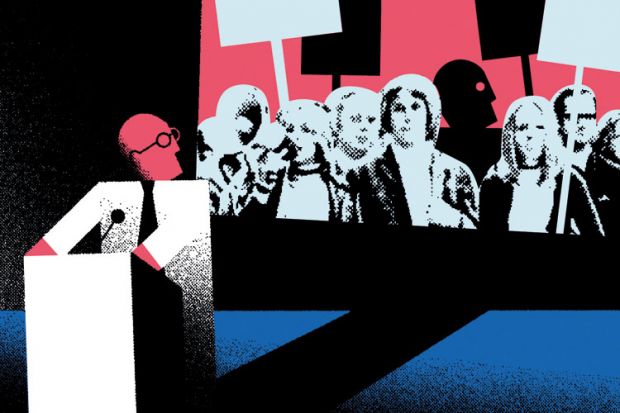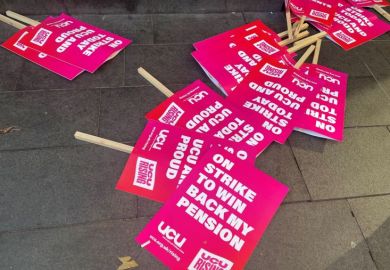Source: Otto
The year began with a terrorist attack that shook Europe: 17 people killed by violent Islamists who struck at the heart of Paris.
The massacre was followed by an outpouring of solidarity with the victims, and a reaffirmation of democratic society’s commitment to liberty and freedom.
Meanwhile, in London, a continuing campaign seeks to bring about the sacking of a controversial former counterterrorism officer who now lectures at London Metropolitan University’s John Grieve Centre for Policing and Community Safety, teaching on terrorism and political violence and responses to both.
In the past few months, a campaign group calling itself Islington Against Police Spies has picketed London Met, calling for Robert Lambert to be dismissed. Lambert has also faced protests at the University of St Andrews, where he lectures at the Centre for the Study of Terrorism and Political Violence.
The backstory is certainly murky. For part of the 1980s and 1990s, Lambert worked as a police officer for the Special Demonstration Squad (SDS), a covert unit within Metropolitan Police Special Branch. In the 1990s he became part of the SDS management team. The SDS is best known today as a result of The Guardian’s reporting of the unit’s infiltration of legitimate and peaceful protests, and a series of unethical and possibly illegal activities. It is for his role in these events that the campaigners are demanding Lambert’s dismissal.
During the time he spent posing as an anarchist animal rights activist in the 1980s, he fathered a child with an activist who said she felt “raped by the state” after learning about the deception. In a Channel 4 interview in 2013, Lambert acknowledged that he had had four sexual relationships under false pretences, had “made serious mistakes that I should regret, and I always will do”, and said: “I apologise to the women affected in my case”. He was also working in the SDS when undercover officers infiltrated potentially violent protest groups that were attempting to attach themselves to the Stephen Lawrence campaign. A series of allegations about police conduct during this period, at the time of the Stephen Lawrence inquiry, are being investigated.
Official inquiries into the SDS continue to be carried out – including those by Derbyshire Constabulary and the Independent Police Complaints Commission – and it is to be hoped that these inquiries will allow a full appraisal of the covert police unit’s activities.
But in the meantime, we must not forget that, pace the reporting by The Guardian, the SDS maintained a central and defining focus on political violence – most notably street violence conducted by and between far-Left and far-Right groups – and helped to save lives, protect property, disrupt extremist groups and prevent disorder. In his only published academic journal article on the subject, Lambert recalls that he targeted animal rights extremists because the government, police chiefs and academics of the day considered them to pose a significant terrorist threat to leading research scientists such as Colin Blakemore.
During years of continuous service within Special Branch, Lambert was also involved in various other roles beyond the SDS. He was at the forefront of fighting all forms of terrorism and political violence, including thwarting plots to assassinate Salman Rushdie following the publication of The Satanic Verses in 1989 and, as he sets out in his 2011 book Countering Al-Qaeda in London: Police and Muslims in Partnership, assisting the FBI during investigations on the 1993 World Trade Center bombing and setting up the Muslim Contact Unit at Special Branch that helped to oust the supporters of Abu Hamza al-Masri from Finsbury Park Mosque in 2005.
While successes do not excuse serious mistakes, and should not be used to silence the anger of spied-upon activists, they can help us to form a fairer and more nuanced picture. Before the media cut him from hero to zero, Lambert was a key contributor to academic and public debates on counterterrorism in 21st-century Britain. If his progressive calls for more participatory and transparent approaches to counterterrorism appear largely inconsistent with the activities of the SDS, the achievements of the Muslim Contact Unit are unquestioned.
For better or for worse, Lambert has been engaged in thinking about and combating terrorism and political violence, first as a police officer and then as a scholar, for over three decades. During the past eight years, he has offered students and scholars alike unique practitioner insights through research and teaching, covering subjects from al-Qaeda to far-Right street violence. There is no doubt that he is eminently qualified to research and teach at a university and it is hoped that London Met is not bullied into losing a valuable academic asset.
As it attempts to exert moral and political leverage on London Met, the campaign urging Lambert’s dismissal is undermined by its own hubris. Not only does it fail to differentiate between academic expertise and morality (are all lecturers made fully accountable for their non-academic past?), it also elevates morality to an absolute virtue floating outside the realm of a complex political world. Notably, it largely ignores the specific context in which Lambert acted and the morass of moral ambiguities inherent in covert policing.
The campaigners disregard the authority and competence of universities to assess and monitor the fitness of their employees. They overlook the broad spectrum of views within terrorism studies, and the strong voice of scholars in the sub-field of critical terrorism studies in questioning state security and the apparatus of mass surveillance, including much of the controversial undercover work conducted by Lambert and his colleagues in the SDS. Campaigners’ concerns about the well-being of students, and whether Lambert can be trusted not to abuse his power, unfairly depict them as fragile flowers deprived of agency.
In short, the campaigners make a weakly argued moral case, but fail to make a robust legal or a pragmatic case, and in such circumstances, dismissing Lambert would seriously undermine the credibility of any autonomous institution. The campaign against Lambert is tantamount to institutional hijacking and attacks the very essence of the university as – in Benjamin Disraeli’s words – “a place of light, of liberty, and of learning”.
POSTSCRIPT:
Print headline: In defence of autonomy
Register to continue
Why register?
- Registration is free and only takes a moment
- Once registered, you can read 3 articles a month
- Sign up for our newsletter
Subscribe
Or subscribe for unlimited access to:
- Unlimited access to news, views, insights & reviews
- Digital editions
- Digital access to THE’s university and college rankings analysis
Already registered or a current subscriber? Login





